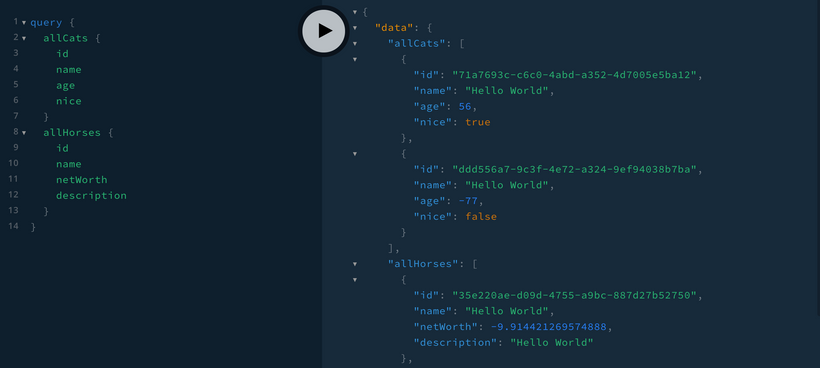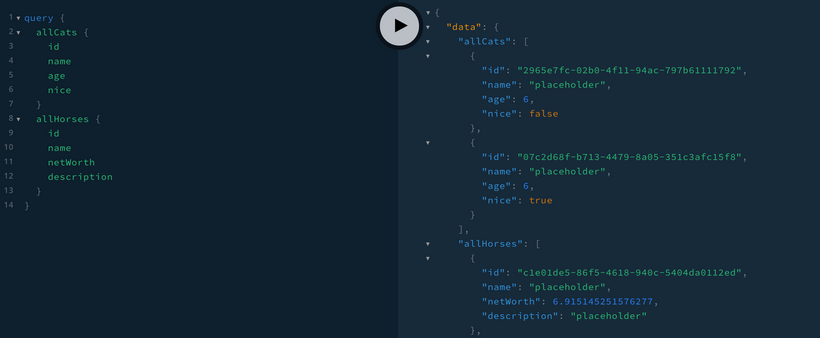One of the most powerful features of GraphQL is its schema definition language. When we write a schema, we define all of the types that are available on our API. If our GraphQL server provides us with an enforced list of type definitions, that means that GraphQL gives us an added benefit: mocking.
Mocking gives us a way to supply fake data for fields that are part of our schema. If a field should return a String type, a mock will return a fake string for that field.
Consider that we're building a website that sells shoes. We'd start by defining the Item type in the schema:
type Item {
id: ID!
name: String!
color: Color!
sizes: [Size!]!
price: Float!
reviews: [Review!]!
}In a perfect world, we would have access to the data (a database, a REST service, etc.) that backs this type, and we could test on the server to make sure that we're able to return the data for an item. But it's not always that easy. The data might be unavailable because it's managed by another team or maybe the service isn't even set up yet. We don't need to let that stop our development flow if we're working with GraphQL. The schema allows us to get prototyping right away with mock data.
One of the ways that you can mock data for a GraphQL server is to use the mocking utilities that are part of Apollo Server. Let's go through the process of setting up a minimal server that incorporates mocks.
Apollo Server Setup
We'll start by setting up a minimal server:
npm init -y
npm install apollo-server graphql
Then we'll create an index.js file to initalize the server. Typically when creating a server, we'd send typeDefs, the schema, and resolvers, the functions that return data for the fields in the schema to the ApolloServer constructor. But let's assume we don't have any data yet. In that case, we'll create the server with the typeDefs and mocks: true:
const { ApolloServer, gql } = require('apollo-server');
const typeDefs = gql`
type Query {
message: String!
}
`;
const server = new ApolloServer({
typeDefs,
mocks: true
});
server.listen().then(({ url }) => console.log(`Server running on ${url}`));Now if you run node index, you'll see the GraphQL Playground running on localhost:4000, and you can send a query for message that returns Hello World:
query {
message
}Creating a Schema
Next, let's add on to our schema to make it more robust.
type Cat {
id: ID!
name: String!
age: Int!
nice: Boolean
}
type Horse {
id: ID!
name: String!
netWorth: Float!
description: String
}
type Query {
allCats: [Cat!]!
allHorses: [Horse!]!
}If we run the server again, we'll see that every query that we send will return data for each field that is defined in the schema.

Each field returns a specific value according to its type:
IDreturns a unique ID (uuid)StringreturnsHello WorldIntreturns a random integer (positive or negative)Floatreturns a random float (positive or negative)
Also, allCats and allHorses are queries that return lists. You'll notice that these queries return two objects. This is the default number of objects that can be returned for a field. Later, we'll learn how to customize the number of list items that are returned.
Creating Custom Mocks
The default mocking behavior of Apollo Server is pretty powerful. With a single line of code mocks: true, we're able to get started with our GraphQL project without writing any resolvers. It's also possible to create custom mocks for individual types and fields.
Mocking Scalar Types
When we create a custom mock, a good place to start is by mocking a scalar type. A custom mock will replace the default value that is supplied by Apollo Server. We'll start by adding a mocks object with a couple methods for Int and String:
const mocks = {
Int: () => 6,
String: () => 'placeholder'
};Then replace mocks: true with the mocks object:
const server = new ApolloServer({
typeDefs,
mocks
});Now if we try sending the query again, any Int will return 6, and any String will return placeholder. Because we haven't defined overwriting mocks for other scalar types, the query will return Apollo Server's mocked defaults for those fields:

Returning Mocked Lists
Every time we send a query that returns a list (allCats, allHorses), we see that two mocked objects are returned. It's possible to customize the number of results for a query that returns a list. We'll use the MockList from Apollo Server:
const { ApolloServer, gql, MockList } = require('apollo-server');Then adjust the mocks object to include the MockList. In this case, let's adjust to make allCats return 5 Cat objects:
const mocks = {
Query: () => ({
allCats: () => new MockList(5)
}),
Int: () => 6,
String: () => 'placeholder'
};It's also possible to return a random number of objects between two numbers. Let's say we wanted every allCats query to return between 1 and 20 cats. Just pass an array into the MockList:
const mocks = {
Query: () => ({
allCats: () => new MockList([1, 20])
})
};Incorporating faker
There are many libraries that generate fake data for mocking purposes. It's fun to incorporate one of these libraries into your GraphQL schema mocking projects. We'll be using faker. Start by installing faker with npm:
npm install faker
Then we'll use this to create some more robust mocks. There are many different faker functions you can use to generate data for various types of fields. The documentation describes all of them! Let's adjust the server to use some of these helpful functions. For example, we can generate a random number between 1 and 25 for an Int. Then we can generate a random firstName for a String:
const mocks = {
...
Int: () => faker.random.number({ min: 1, max: 25 }),
String: () => faker.name.firstName()
};You can even do tricky things like return a random item from an array using faker. Let's create a list of horseDescriptions that will be returned for the description field:
const horseDescriptions = ['majestic', 'honorable', 'street smart'];
const mocks = {
Horse: () => ({
description: () => faker.random.arrayElement(horseDescriptions)
})
};The random array element function will take in the array of options and return one at random when queried.
Mocking Part of the Schema
Another common situation that you might encounter when mocking is that you have access to some but not all data. It's possible to write resolver functions for certain fields and then mock the rest of the data. Let's consider the following resolver for allHorses:
const resolvers = {
Query: {
allHorses: () => [
{
id: 1,
name: 'Hank'
}
]
}
};This is a small example, but you might make database calls or REST requests in a resolver like this to a current working service. Once created, you'll adjust the server constructor to include the resolvers and an important configuration option, mockEntireSchema:
const server = new ApolloServer({
typeDefs,
resolvers,
mocks,
mockEntireSchema: false
});If mockEntireSchema is set to false, fields that have resolvers will use the resolvers. Fields that don't have resolvers will use the mocks.
GraphQL is a type system for your API. These types that are provided by the schema allow us to mock data fields so that we can move quickly to create GraphQL prototypes even if we don't have access to all of the data.

